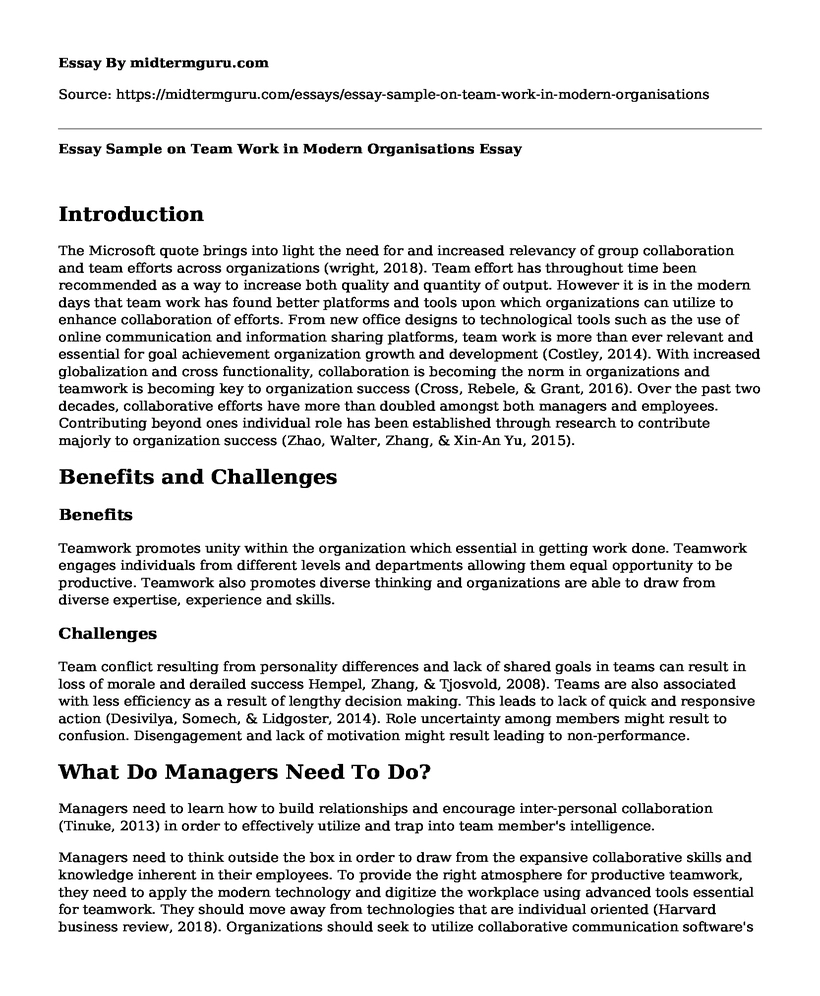Introduction
The Microsoft quote brings into light the need for and increased relevancy of group collaboration and team efforts across organizations (wright, 2018). Team effort has throughout time been recommended as a way to increase both quality and quantity of output. However it is in the modern days that team work has found better platforms and tools upon which organizations can utilize to enhance collaboration of efforts. From new office designs to technological tools such as the use of online communication and information sharing platforms, team work is more than ever relevant and essential for goal achievement organization growth and development (Costley, 2014). With increased globalization and cross functionality, collaboration is becoming the norm in organizations and teamwork is becoming key to organization success (Cross, Rebele, & Grant, 2016). Over the past two decades, collaborative efforts have more than doubled amongst both managers and employees. Contributing beyond ones individual role has been established through research to contribute majorly to organization success (Zhao, Walter, Zhang, & Xin-An Yu, 2015).
Benefits and Challenges
Benefits
Teamwork promotes unity within the organization which essential in getting work done. Teamwork engages individuals from different levels and departments allowing them equal opportunity to be productive. Teamwork also promotes diverse thinking and organizations are able to draw from diverse expertise, experience and skills.
Challenges
Team conflict resulting from personality differences and lack of shared goals in teams can result in loss of morale and derailed success Hempel, Zhang, & Tjosvold, 2008). Teams are also associated with less efficiency as a result of lengthy decision making. This leads to lack of quick and responsive action (Desivilya, Somech, & Lidgoster, 2014). Role uncertainty among members might result to confusion. Disengagement and lack of motivation might result leading to non-performance.
What Do Managers Need To Do?
Managers need to learn how to build relationships and encourage inter-personal collaboration (Tinuke, 2013) in order to effectively utilize and trap into team member's intelligence.
Managers need to think outside the box in order to draw from the expansive collaborative skills and knowledge inherent in their employees. To provide the right atmosphere for productive teamwork, they need to apply the modern technology and digitize the workplace using advanced tools essential for teamwork. They should move away from technologies that are individual oriented (Harvard business review, 2018). Organizations should seek to utilize collaborative communication software's at workplaces such as video conferencing, meeting systems. Connectivity tools in the modern age bring people together and allow better collaboration. They should also utilize the use of open offices to enhance collaboration. Reduced spatial boundaries facilitate teamwork and minimize isolation (Bernstein & turban, 2018). Enhanced transparency motivates team work. Managers should create a culture of openness and responsibility towards goal achievement and overall organizational performance.
Managers should set shared goals within the organization to encourage collaborative ideas and solutions. They should also enhance open communications with and among employees. The need to recognize team effort and performance is also crucial. Management should focus on providing incentives and performance based reward systems that focus on team effort and results. This enhance competitive performance amongst teams. No one should take credit alone for team effort. (Kate, 2017). Organizations should encourage use of shared recourses across organizations such as information platforms, cloud based data base systems etc.
References
Bernstein, E. S., & Turban, S. (2018). The impact of the 'open' workspace on human collaboration. Philosophical transactions for the royal society, 373(1753). doi:10.1098/rstb.2017.0239
Cole, M. L., Stavros, J., & Cox, J. D. (2016). Building collaboration in teams through emotional intelligence: Mediation by SOAR (strengths, opportunities, aspirations, and results). Journal of Management & Organization. doi:10.1017/jmo.2016.43}
Costley, K. C. (2014). The Positive Effects of Technology on Teaching and Student Learning. Arkansas: Ed.gov. Retrieved from https://files.eric.ed.gov/fulltext/ED5545557.pdf
Cross, R., Rebele, R., & Grant, A. (2016, January). Collaborative Overload. Havard Business Review. Retrieved from Havard Business Review: https://hbr.org/2016/01/collaborative-overload
Desivilya, H. S., Somech, A., & Lidgoster, H. (2014). Innovation and Conflict Management in Work Teams: The Effects of Team Identification and Task and Relationship Conflict. Negotiation and Conflict Management Research. Retrieved from http://citeseerx.ist.psu.edu/viewdoc/download?doi=10.1.1.464.7311&rep=rep1&type=pdf
Harvard Business Review. (2018). The Workplace Evolution. Pulse Survey. Retrieved from https://query.prod.cms.rt.microsoft.com/cms/api/am/binary/RE23w1o
HEMPEL, P. S., ZHANG, Z.-X., & TJOSVOLD, D. (2008). Conflict management between and within teams for trusting relationships and performance in China. Journal of Organizational Behavior, 30, 41-65. doi: 10.1002/job.540
Kate, J. (2017). Teamwork Can Change Everything : Journal of Infusion Nursing. Journal of Infusion Nursing, 40(2), 90. doi:10.1097/NAN.0000000000000213
Tinuke, F. (2013). Towards Effective Team Building in the Workplace. International Journal of Education and Research, 1(4), 1-12. Retrieved from http://www.ijern.com
Wright, L. (2018, April 19). New survey explores the changing landscape of teamwork. Retrieved from Microsoft.com: https://www.microsoft.com/en-us/microsoft-365/blog/2018/04/19/new-survey-explores-the-changing-landscape-of-teamwork/
Yu, C. (2018). Literature review on collective intelligence: a crowd science perspective. INTERNATIONAL JOURNAL OF CROWD SCIENCE, 2(1), 64-73. doi:doi.org/10.1108/IJCS-08-2017-0013
Zhao, L. N., Walter, H. H., Zhang, S. L., & Xin-an Yu, J. (2015). Achieving more with less: Extra milers' behavioral influences in teams. Journal of Applied Psychology, 100(4), 1025-1039. doi:http://dx.doi.org/10.1037/apl0000010
Cite this page
Essay Sample on Team Work in Modern Organisations. (2022, Oct 25). Retrieved from https://midtermguru.com/essays/essay-sample-on-team-work-in-modern-organisations
If you are the original author of this essay and no longer wish to have it published on the midtermguru.com website, please click below to request its removal:
- Management Control Systems in Healthcare
- Global Business Cultural Analysis: Case of Israel
- Planning and Allocation of Work - Paper Example
- Paper Example on Leadership Style and Organizational Culture
- Essay Sample on Leadership: Influence, Power, Tactics - Connecting the Dots
- Drybar: From Humble Beginnings to Million-Dollar Hair Straightening Chain - Essay Sample
- Entrepreneurial Leadership and Management: Keys to Business Success - Essay Sample







